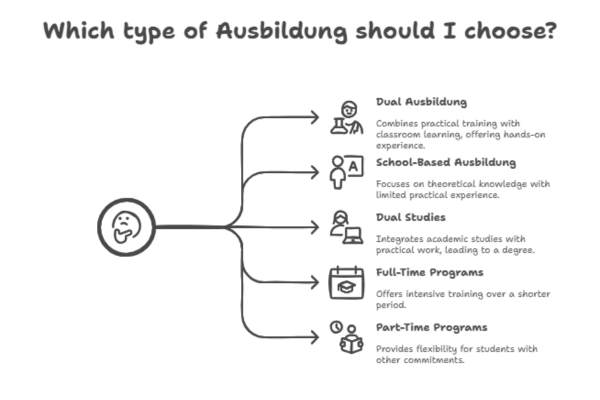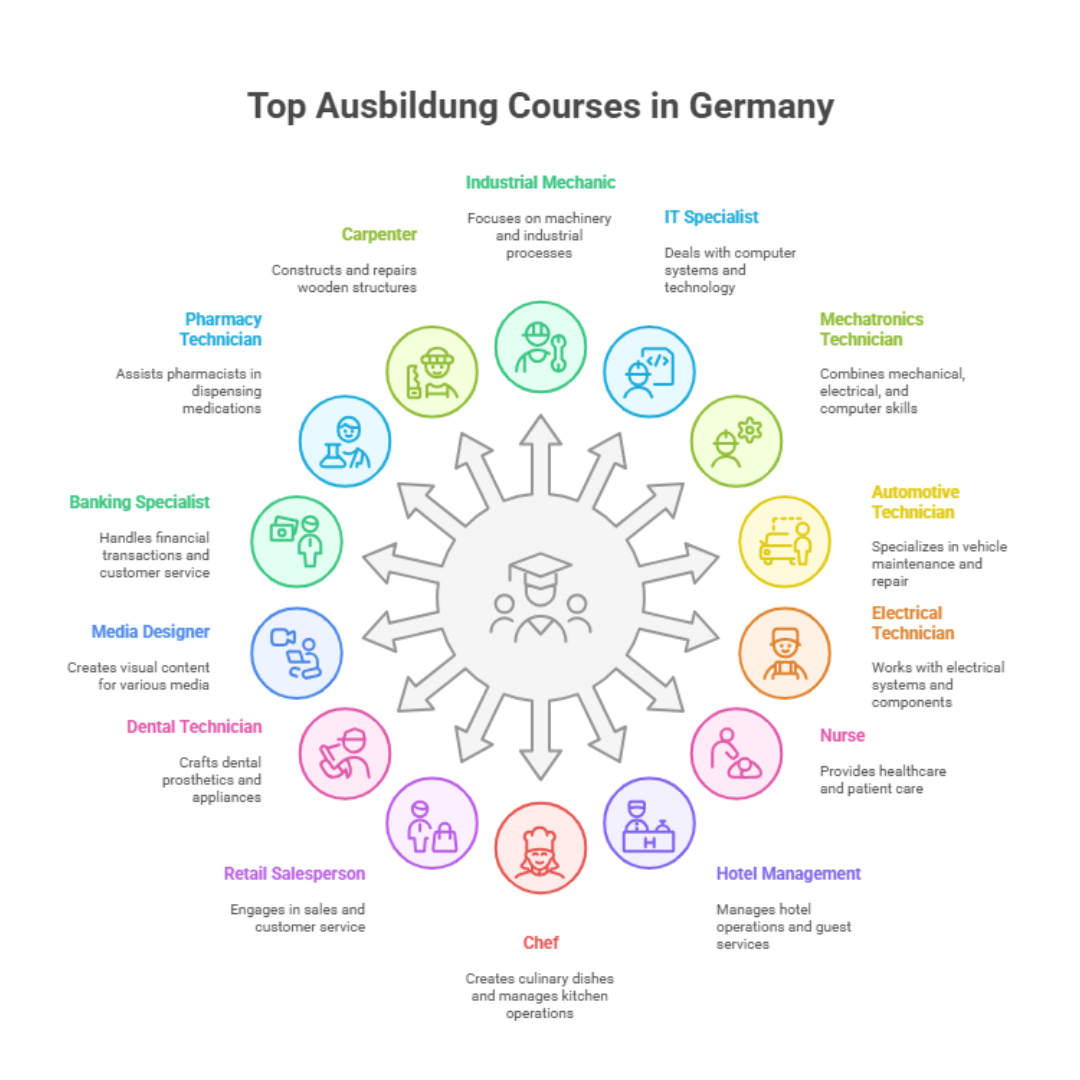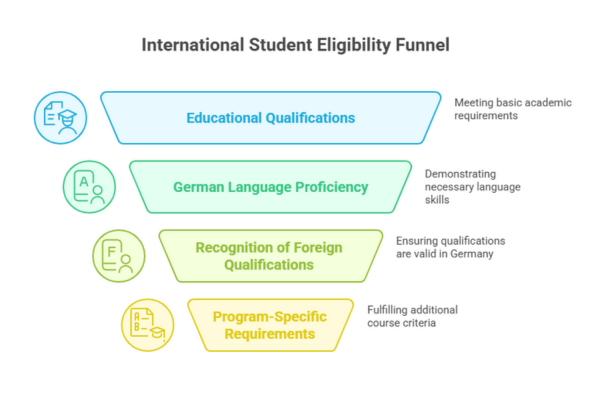Germany has emerged as a top destination for career-focused education, especially through its renowned Ausbildung courses in Germany. As of 2025, these dual vocational training programs are not just shaping the local workforce but are also opening doors for international students looking for hands-on skills, job security, and global employability.
At the core of Germany’s education system lies its dual vocational training model, known as Duale Ausbildung. This system combines classroom instruction at vocational schools (Berufsschule) with on-the-job training at a real company. This balance ensures that students not only learn the theory but also gain real-world experience from day one.
Success stories are growing. For instance, Indian students enrolled in nursing Ausbildung programs through Genius Study Abroad have secured stable jobs and long-term work visas within two years of arrival.
If you’re looking for a practical, career-oriented study route with international credibility, Ausbildung courses in Germany offer one of the best opportunities in 2025.
Also Read : What is the current acceptance rate at Constructor University in 2025?
Understanding Ausbildung: The Dual Vocational Training Model
If you’re considering a career-focused educational path in Germany, Ausbildung Courses in Germany offer a unique and practical route. The “Ausbildung” system—also known as the Dual Vocational Training Model—is one of the most successful models in Europe, combining classroom instruction with real-world job training. It’s designed to help students gain both theoretical knowledge and hands-on experience simultaneously.
📚 Structure: A Perfect Blend of Theory and Practice
Ausbildung programs usually comprise a combination of on-the-job training at a company and a vocational school (Berufsschule). This dual approach ensures that graduates are well-prepared for employment, with around 90% of students securing jobs immediately after completion, according to Germany’s Federal Institute for Vocational Education and Training (BIBB).
⏳ Duration: Tailored for Practical Learning
Ausbildung Courses in Germany usually last between 2 to 3.5 years, depending on the profession and individual performance. Some programs even allow high-performing students to finish earlier, giving them a head-start in their careers.
📌 Types of Ausbildung:

- Dual Ausbildung: The most common model where students alternate between school and workplace training. Popular in fields like automotive, engineering, hospitality, and healthcare.
- School-Based Ausbildung: Offered through full-time vocational schools, especially in areas like healthcare, childcare, or design.
- Dual Studies (Duales Studium): A combination of university-level studies and company work experience. Ideal for those aiming for careers that blend theory with high-level industry practice.
- Full-Time and Part-Time Programs: Some institutions offer flexible options, making Ausbildung Courses in Germany more accessible to international students and those already working part-time.
Also Read : Best Consultancy in India for Abroad Studies | Top Study Abroad Experts 2025
🌍 Why Choose Ausbildung as an International Student?
With over 300 officially recognized Ausbildung professions and a shortage of skilled workers in sectors like nursing, IT, and logistics, Germany is actively encouraging international applicants. Genius Study Abroad helps students from around the world navigate the admission process, visa applications, and German language preparation to enroll in the right Ausbildung Courses in Germany.
Top 15 Highest-Paid Ausbildung Courses in Germany — 2025 Update

Pursuing Ausbildung Courses in Germany is one of the smartest career moves for international students aiming for both practical skills and financial independence. These dual vocational training programs offer not only hands-on experience but also monthly stipends—making them a financially viable alternative to traditional university degrees. As of 2025, here are the top 15 highest-paid Ausbildung programs in Germany, with average monthly stipends and long-term career prospects:
- Industrial Mechanic (Industriemechaniker) – €1,100–€1,400/month
Strong demand in manufacturing industries; high employability post-training. - IT Specialist (Fachinformatiker) – €1,000–€1,200/month
Opportunities in software development, system integration, and cybersecurity. - Mechatronics Technician (Mechatroniker) – €1,050–€1,300/month
Involves mechanics, electronics, and computing—ideal for tech lovers. - Automotive Technician (Kfz-Mechatroniker) – €1,000–€1,200/month
Germany’s booming auto industry ensures stable job placement. - Electrical Technician (Elektroniker) – €950–€1,150/month
Essential in infrastructure projects and green energy sectors. - Nurse (Pflegefachkraft) – €1,000–€1,200/month
Healthcare professionals are highly sought-after due to an aging population. - Hotel Management (Hotelfachmann/-frau) – €900–€1,100/month
Attractive for those aiming to work in Germany’s hospitality and tourism sectors. - Chef (Koch/Köchin) – €850–€1,050/month
Opportunities in fine dining and international kitchens. - Retail Salesperson (Einzelhandelskaufmann/-frau) – €800–€1,000/month
Vital in Germany’s strong retail market; good for customer-oriented individuals. - Retail Salesperson(Fachkraft für Lagerlogistik) – €900–€1,100/month
Key role in e-commerce and supply chain operations. - Dental Technician (Zahntechniker) – €850–€1,050/month
Precision-based work with promising niche demand. - Media Designer (Mediengestalter) – €800–€1,000/month
Ideal for creatives in advertising, film, and digital design. - Banking Specialist (Bankkaufmann/-frau) – €950–€1,150/month
Strong foundation for a long-term career in finance. - Pharmacy Technician (Pharmazeutisch-technischer Assistent) – €900–€1,100/month
Support role in pharmacies and medical institutions. - Carpenter (Tischler/Schreiner) – €850–€1,050/month
Hands-on career with potential to start your own business.
Choosing the right Ausbildung Courses in Germany can lead to a well-paying job even without a university degree. Many of these professions offer direct pathways to permanent residency and even German citizenship.
At Genius Study Abroad, we specialize in helping Indian students find the best Ausbildung Courses in Germany tailored to their interests, academic background, and career goals. Our counselors provide end-to-end support—from course selection and application to visa processing.
If you’re ready to earn while you learn in Germany, start your journey with Genius Study Abroad today.
Also Read : Understanding the ‘Made in Germany’ Advantage: A Guide for Education Consultants
Eligibility Criteria for International Students: Ausbildung Courses in Germany

Taking an Ausbildung Course International students can find a realistic route to a prosperous career with courses in Germany. To gain admission, it is essential to fulfill the eligibility requirements.
1. Educational Qualifications
To enroll in Ausbildung Courses in Germany, students must have completed a secondary school diploma or its equivalent, such as the 10+2 system in India. This ensures you’re academically prepared for vocational training in sectors like healthcare, engineering, IT, or hospitality.
2. German Language Proficiency
Most Ausbildung Courses in Germany are conducted in German, so proficiency at the B1 or B2 level (as per the Common European Framework of Reference for Languages – CEFR) is mandatory. Language skills are not just for classroom learning but also for effective communication at the workplace during your dual training.
3. Recognition of Foreign Qualifications
Your school-leaving certificate must be recognized in Germany. Agencies like ZAB (Central Office for Foreign Education) evaluate your documents. Some vocational schools may also involve the Anabin database to compare international qualifications. Genius Study Abroad assists students through this process to ensure smoother acceptance.
4. Additional Program-Specific Requirements
Certain Ausbildung programs may require specific subjects or prior experience. For instance, nursing or medical-related courses might need biology or chemistry backgrounds, while technical programs might look for mathematics or physics.
With thousands of students applying each year and a high demand for skilled workers in Germany—especially in sectors like elderly care, IT, and automotive—meeting these eligibility criteria is the first step toward building a successful future.
Genius Study Abroad helps students not just meet these requirements but also guides them through the entire admission and relocation process for Ausbildung Courses in Germany.
Also Read : Cost of Study in Germany: Budgeting Tips for Indian Students in 2025
Application Process for Ausbildung Courses in Germany
Applying for Ausbildung Courses in Germany can seem daunting, but breaking it down step-by-step makes it manageable and rewarding. The first step is researching suitable programs and companies. Germany offers over 300 recognized Ausbildung professions, ranging from technical fields like engineering to healthcare and hospitality. Platforms such as the Federal Employment Agency (Bundesagentur für Arbeit) and popular job portals like Ausbildung.de and StepStone are great starting points. Additionally, many companies post openings directly on their websites.
Once you’ve identified programs that match your interests and qualifications, the next crucial phase is preparing application documents. This typically includes a professional CV, a tailored cover letter, and relevant certificates like school diplomas or language proficiency tests. Remember, the CV should highlight your motivation and skills related to the training occupation. According to recent statistics, over 60% of successful applicants personalize their cover letters to the specific company, which significantly improves their chances.
Next, submitting applications is done through multiple channels — directly on company websites, via job portals, or through the Federal Employment Agency’s platform. It’s important to track your applications and follow up politely if you don’t hear back within a few weeks.
Finally, interview preparation is key to securing a training contract. Interviews for Ausbildung Courses in Germany often include questions about your motivation, understanding of the profession, and sometimes practical tasks. Practicing common questions and researching the company culture can set you apart. Genius Study Abroad guides students through this entire process, offering personalized support from document preparation to mock interviews, increasing your chances of success.
By carefully navigating these steps, you can secure a spot in Ausbildung Courses in Germany and start a promising career path in one of Europe’s most robust vocational training systems.
Visa and Financial Requirements for Ausbildung Courses in Germany
If you’re planning to pursue Ausbildung Courses in Germany, understanding the visa and financial requirements is crucial for a smooth journey.
Types of Visas for Ausbildung Students

Most students enrolling in Ausbildung programs need to apply for a Student Visa or a Trainee Visa (also called the “Ausbildungsduldung”). The Student Visa is generally for those attending theoretical courses, while the Trainee Visa suits those combining practical training with classroom learning. Visa processing times can vary but usually take between 4 to 8 weeks, so early application is key.
Financial Proof: Blocked Account, Stipends, and Additional Funds
Germany requires you to prove you have sufficient funds to support yourself during your Ausbildung. One common way is opening a blocked account (“Sperrkonto”), which currently needs about €11,208 (as of 2025) to cover living expenses for one year.
Many Ausbildung programs offer monthly stipends ranging from €850 to €1,200, helping reduce your financial burden. However, having additional funds is recommended to cover initial costs such as accommodation, travel, and insurance.
Health Insurance and Other Mandatory Requirements
Health insurance is mandatory in Germany. You must have valid coverage from either a German public health insurer or a recognized private insurer before your visa is approved. This protects you from unexpected medical expenses and is a legal requirement.
Other mandatory requirements include registering your residence (“Anmeldung”) once you arrive in Germany and sometimes attending an integration or language course depending on your program.
Navigating these requirements might feel overwhelming, but with expert guidance from Genius Study Abroad, your pathway to successful enrollment in Ausbildung Courses in Germany becomes clearer and hassle-free. They provide personalized support for visa applications, financial planning, and all mandatory steps, ensuring you focus on your training and future career.
Cost of Living and Financial Support for Ausbildung Courses in Germany

When considering Ausbildung Courses in Germany, understanding the cost of living and financial support options is crucial for planning your stay. International students’ monthly expenses, which include housing, food, transportation, and other necessities, often fall between €800 and €1,200. For example, renting a shared apartment or student dormitory can cost around €300 to €500 per month, while groceries and dining out typically amount to €200 to €300. Public transportation is quite affordable, with monthly passes costing approximately €70 to €90 in most cities.
One of the biggest advantages of Ausbildung Courses in Germany is the financial support through stipends that increase as you progress through your training years. Typically, apprentices earn between €850 and €1,200 per month in the first year, with this amount rising to €1,100 to €1,400 by the third year. This stipend helps cover living expenses and reduces the financial burden on students, making Ausbildung a financially viable path.
Moreover, international students can benefit from various scholarships and grants offered by German institutions, government programs, and private foundations. For instance, the DAAD (German Academic Exchange Service) offers scholarships specifically aimed at supporting vocational training and apprenticeship students. Genius Study Abroad helps guide students through these opportunities to ensure they maximize financial aid options.
Choosing Ausbildung Courses in Germany is not just about gaining hands-on skills but also about making an economically smart decision. With manageable living costs, growing stipends, and access to scholarships, many international students find Ausbildung a balanced and rewarding way to study and work in Germany.
Career Opportunities Post-Ausbildung

Completing Ausbildung courses in Germany opens up a world of career opportunities backed by impressive employment rates. According to the German Federal Employment Agency, over 80% of Ausbildung graduates secure jobs within six months of completing their training. This high demand spans multiple sectors such as engineering, healthcare, IT, and hospitality, reflecting Germany’s strong economy and skilled workforce needs.
One of the unique advantages of pursuing Ausbildung courses in Germany is the option to further specialize or continue education. Many graduates opt for advanced technical qualifications or university degrees to deepen their expertise, making them even more competitive in the job market.
Moreover, Ausbildung is a recognized pathway toward permanent residency in Germany. Completing these courses not only equips you with practical skills but also enhances your chances of long-term career growth and stability. Germany values skilled professionals, and through Ausbildung, international students can integrate smoothly into the workforce while building a promising future.
If you’re considering this route, Genius Study Abroad can guide you through every step, ensuring you make the most of your Ausbildung journey in Germany.
Future Trends in Ausbildung Programs

Future Trends in Ausbildung Courses in Germany are shaping up to meet the evolving demands of the job market and society. One major trend is digitalization, with a growing number of IT and tech-focused Ausbildung courses in Germany. For example, professions like IT specialist and software developer are increasingly popular, reflecting Germany’s strong push toward Industry 4.0 and digital transformation.
Another significant trend is sustainability. Ausbildung courses in Germany are now offering green jobs and environmentally focused training, such as renewable energy technician or environmental management assistant. This shift aligns with Germany’s ambitious goal to become carbon neutral by 2045, creating a rising demand for skilled workers in sustainable industries.
Finally, the healthcare sector is expanding due to Germany’s aging population. Ausbildung courses in Germany related to healthcare, such as elderly care nursing and medical assistants, are vital to address this growing need. With approximately 22% of Germany’s population over 65, the demand for trained professionals in this sector is expected to increase significantly.
If you want to explore the latest Ausbildung courses in Germany tailored to these future trends, Genius Study Abroad can guide you through the best options and support your journey toward a promising career.
Conclusion
Embarking on your Ausbildung journey in Germany opens doors to exceptional career opportunities and personal growth. Ausbildung courses in Germany provide a unique blend of practical training and academic learning, giving international students a strong foundation in skilled professions that are in high demand. With Germany’s robust economy and focus on vocational education, these courses offer a clear pathway to long-term employment and cultural integration.
Taking proactive steps towards your application is crucial. Research thoroughly, prepare your documents, and reach out early to increase your chances of securing a spot. Remember, many international students have successfully transformed their futures through Ausbildung courses in Germany, and you can too.
Support is readily available — organizations like Genius Study Abroad specialize in guiding students through the entire process, from course selection to visa assistance. Additionally, numerous resources such as student networks, government programs, and language courses help international students adapt and thrive during their Ausbildung experience.



